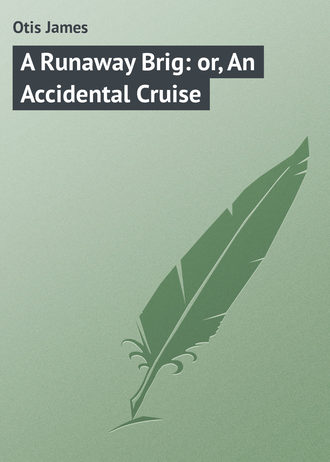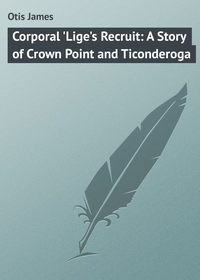 полная версия
полная версияA Runaway Brig: or, An Accidental Cruise
Immediately after breakfast Bob, Joe and Harry went into the hold, and the work of stowing the bags among the ballast where it would escape observation was begun.
The gravel and rocks were first dug away until the keelson was exposed, and on this timber the gold was packed, after which everything was replaced as before, leaving the bags buried to the depth of six or eight inches. The hoard was thus hidden so securely that there was little chance that it would be found unless the searchers had positive information of its being on board.
This work was hardly finished when Walter came below with the information that the two men were leaving the key, and Bob and Joe hurried on deck, for it was by no means certain some demonstrations against the steamer would not be made.
In this, however, they were happily mistaken. Neither he with the red nose nor the Mexican had any idea of trusting their precious bodies within reach of possible harm; but they stopped the boat fifty or sixty yards away while the leader shouted:
"Do you still say that you won't lift a hand toward helpin' the brig off the shoal?"
"There's nothin' we're able to do," Bob replied. "The tug is as useless as a raft, an' it'll be three weeks at the very soonest before the screw can be turned. I'm willin', though, to say we wouldn't help you if we could, so it's no use to do any chinnin'!"
The red-nosed man appeared to think that some vent for his anger was absolutely necessary, and he catered to this feeling by shaking his fist threateningly, after which the two rowed out of the cove.
"I don't reckon them kind of monkey-shines will do us much harm," Bob said philosophically as he walked slowly aft to where Joe had recommenced his long task of repairing the engine, as if time was too precious to be wasted on such villains as those in the boat.
"If they're wise we sha'n't see so much as their noses again," the engineer said. "This craft wouldn't be of any service if we should offer to give her up, and the scoundrels ought to be in too much of a hurry to leave the vicinity, where the schooner from Nassau may put in at any moment, to waste much time on spite-work!"
"I reckon you're about right; but at the same time, it stands us in hand to be ready if they should take it into their ugly heads to kick up a row. After we've made sure they're really gone I'll take two of the boys ashore an' bring off a cask of water. It's got to be done before we can leave, an' now's as good a time as any."
There was nothing the remainder of the crew could do to help Joe, however disposed they might be for the task, and he made no objection to the plan.
The yawl was lowered, an empty cask put on board, and, with Harry in the stern-sheets, Bob and Jim pulled the little craft out toward the open water until it was possible to see the enemy fully a mile away as they rowed around the key.
"We're all right now," Bob said after one glance at the two men. "There's no chance of them villains getting back before we fill the cask; so head her for the shore, lad."
It was a difficult job to get the water-butt, after it had been filled, from the spring to the boat, and the forenoon was well-nigh spent when the task had been accomplished. The only thing in the laborers' favor was the fact that the sun no longer sent down such fervent rays upon the parched land. At about ten o'clock clouds began to gather, and had continued to do so until the entire heavens were covered as by a veil, much to Bob's disquietude.
"There's more than rain in them, lads," he said with an ominous shake of the head when they emerged from the thicket with the unwieldy burden. "If I ain't 'way out of my reckonin' we'll get a capful of wind from the east before mornin', an' the Sea Bird stands a slim chance of keepin' off the shore."
"With both anchors down I don't see how any harm can come to her, no matter how much of a gale we have," Harry replied as he gazed toward the trim little steamer, which was moored so securely bow and stern.
"I'm afeared you'll have a chance of seein' how it can be done. This sandy bottom ain't the best holdin'-ground for an anchor, an' once she begins to drag nothin' can stop her. Howsomever," he added in a more cheerful tone, "we needn't croak till the trouble comes; but it's best to get aboard lively an' make preparations for a dirty night. It won't take much of a wind to knock the brig to pieces if she's on the outer edge of the shoal, so we can reckon on that red-nosed villain an' his mates comin' ashore about sunset."
It was necessary for the rowers to exert all their skill and strength on the oars to prevent the yawl from being swamped during the return to the steamer. Already had the sea begun to rise, and the white-capped waves which now beat heavily against the shore gave token of what force they would exert when roused to fury by the east wind, which was causing the trees to wave helplessly to and fro against the gray sky.
The little boat was loaded to the gunwales, and despite every effort the green water rushed in over the rail very often, much to Harry's alarm. By pulling around to the starboard bow of the steamer, where they would be partially sheltered from both wind and wave, it was possible to get the heavy cask on board without mishap, after which the yawl was hooked on the falls and hoisted up; otherwise she would speedily have been stove to pieces against the larger craft.
"It looks as if we were to have a bad night," Joe said when the work was finished and all hands went aft once more.
"The worst we could have," Bob replied gloomily. "The chances are the steamer will be driven ashore, and there's no question about those villains leaving the brig; so unless this wind takes a different slant before sunset we can count on bein' penned up on the island with them as jolly companions. But we can't afford to moon 'round very long tellin' what's goin' to happen, for there's plenty of work to be done. The awnin' must be taken down an' the cables overhauled."
Then he called for the boys to "bear a hand," and soon all were busily preparing for what was apparently the inevitable.
By the time the deck had been cleared and everything made snug the Sea Bird was dancing about like a cork, flinging the spray fore and aft as she came up on the cables with a thud that caused the timbers to creak, or plunging her bow under until the deck was awash.
At five o'clock in the afternoon the gale was full upon them, coming directly out of the east, and so furiously did the little craft toss and pitch that Bob took the precaution of stretching life-lines fore and aft. The cables had been slackened to give plenty of scope; but she overrode the bow anchor until one would have fancied, from the savage jerks which the steamer gave, that it had been hove short.
There was no thought of cooking. Jim could hardly have remained on his feet in the galley, for the swell was shorter and more violent than it would have been on the open ocean; therefore the anxious ones were forced to eat dry ship's-biscuit with the poor consolation in mind that before morning all their stores might be at the bottom of the sea.
The boys were in the pilot-house, where they could have a view of all that was going on and yet be in a position to render immediate assistance if it was needed. Joe and Bob remained on deck despite the spray which fell like rain; and the former said to the old sailor toward night, as he made his way forward after great difficulty:
"We can get some pleasure out of the fact that the men haven't come ashore from the brig. There's no chance of their making harbor in the teeth of this wind, and we can count on having got rid of them."
"That's where you make a mistake, my hearty. They most likely landed two or three hours ago, runnin' down the western shore, where they'd find sheltered water. Them men ain't fools if they are villains, an' by noon knowed the brig couldn't hold together much longer. The chances are she was bilged two hours ago, an' has gone to pieces by this time."
Joe went aft again, looking more disconsolate than ever. He had felt positive the enemy had not abandoned the vessel, and his disappointment was all the greater because this hope had been so strong.
When the gray light of day gave place to the darkness of night the anchors still held; but the steamer was laboring so much on account of the bow hawser that Bob decided it would be necessary to shift the strain, despite the danger attendant upon such an undertaking.
"All hands on deck!" he shouted at the door of the pilot-house, adding warningly, as the boys crept out, "keep a firm hold of the life-lines, lads, for he who falls overboard will stand a poor chance of saving himself."
To make the proposed change it was necessary to carry the cable astern after it was cast off the bitt, for all the slack had long since been let out, and rapidity of movement was as essential as strength.
"Wait till she buries her nose once more, an' then rush when she rises," Bob shouted as he threw off two or three turns of the rope.
Up, up the little craft rose as the great green waves swept beneath, and then when the hawser chucked her and the fall began, the signal was given:
"All hands with a will now!" the old sailor shouted; and in an instant the crew were rushing madly aft, the heavy cable nearly dragging them from their feet.
Bob had been correct as to the precise time when this maneuver should be executed; but he failed to give due consideration to the force the under-tow would exert in such shoal water. The hawser had but just been loosened from the bitt when the drag of the waters began. All hands clung with a force born of desperation; but their efforts were vain.
A crew of giants could not have resisted the strain upon the wet, iron-like rope, and Bob shouted wildly when he was almost at the taffrail:
"Let go! For your lives let go!"
Fortunately this order was obeyed before any one had been injured in the rush, and as the hawser disappeared over the stern Joe muttered half to himself, but so loud that Harry could distinguish the words:
"We've done all we could to wreck the little craft. It would have been better to let her labor with the risk of chafing the rope apart, rather than deliberately throw one anchor away when two hardly held her!"
CHAPTER XXIV.
ASHORE
The rain, which was now falling in torrents, the driving surf, and the pitching of the steamer, all served to make it difficult to keep one's footing on the slippery planks, and Jim motioned his companions to follow him into the pilot-house, for now that the hawser had been swallowed up by the waves their services were no longer required outside.
"Stay on deck!" Bob cried, as he saw them moving away, and forced to shout at the full strength of his lungs in order to make himself heard above the roar of the tempest. "In case she strikes you must be where there's a chance of savin' your lives. Get under the lee of the house for'ard, an' hold on for all you're worth!"
After some considerable difficulty the boys succeeded, by working along the life-lines, in reaching the bow, where, partially protected by the pilot-house, it was possible to remain in comparative shelter.
"Do you think the tug will be wrecked, Jim?" Harry asked.
"I reckon she'll drive ashore."
"Then we shall be no better off than if we hadn't found the pirates' gold, for of course it'll all be lost."
"Not unless she goes to pieces!" Jim replied in a decidedly shaky voice; and then, as if this subject was an unpleasant one, he changed it by asking, without any idea the question would be answered:
"What's Bob doin' aft so long? He can't expect to pick up that hawser ag'in, an' it's more dangerous there than here!"
"He's coming now," Walter replied as he crept to the corner of the house; and at the same instant that a huge wave rolled inboard, sweeping the decks with almost irresistible violence, the old sailor and Joe appeared, literally working their way hand over hand by means of the life-line.
Arriving under the lee of the pilot-house they halted, and waited in silence for the shock which should tell that the Sea Bird had been forced into shoal water.
This unpleasant information was not long delayed. The little steamer pitched and plunged more violently than before, but without the sickening motion of being dragged under, which was apparent when the bow anchor held, and after ten minutes of this wild tossing she lurched forward suddenly as if the screw had been set in motion.
"Hold on for your lives!" Bob shouted, and a moment later the tug struck heavily, with such force that but for the timely warning more than one of the crew would have been hurled forward.
All hands waited with bated breath for the succeeding shocks which would tell that she was pounding herself to pieces on the sand; but much to their surprise nothing of the kind was felt.
"The stern anchor is holding her down!" Bob shouted to Joe, and the words were hardly spoken when the water dashed forward, flooding the decks even with the rail.
"We'll be drowned here in short order!" Joe cried as he struggled toward the boys. "Get into the pilot-house, if you can, for the danger is less there while the decks are being swept!"
Fortunately for all hands the door opened at the top of a short flight of stairs above the level of the rail, and this the engineer succeeded in opening by watching his opportunity between the heavy waves. Harry and Walter gained this shelter before the sea rushed forward again, and at the next interval of comparative quiet the remainder of the party joined them.
It was now possible to converse without actually shouting, and Joe was eager to understand why the tug remained immovable when in the ordinary course of events she should be beating herself to pieces on the shoal.
"The anchor slipped enough to let her drive ahead a bit," Bob said, in explanation, "an' then brought up just as she struck. You'll most likely find the hawser taut as an iron bar; and that, together with the hold the sand has got on her nose, keeps everything firm."
"And if the anchor should give way once more she'd break up?"
"There's no doubt about that; but I've got an idee the wind hasn't got as much force as it had half an hour ago. If the timbers will stand that poundin' astern there's a chance of our gettin' outer this scrape after all, even though things do look so tough."
It was but natural that all hands should devote their entire attention to ascertaining if the gale really was abating, since this was their only hope, and when another half-hour had elapsed the question was decided. The seas still beat against the stranded steamer with the same violence, but the rain had nearly ceased, and the wind no longer howled around the doomed craft with its former fury.
When this became an assured fact, it was, as nearly as Bob could judge, about midnight; and the weary boys thought with dismay of the many hours which must elapse before they could gain a place of absolute safety.
"Lie down and go to sleep, if you can," the old sailor said, much as if he knew of what they were thinking. "I reckon the worst is over, an' since it's only a question of waitin' you'd best get all the rest possible."
The boys followed this suggestion by curling themselves up on the cushioned locker; and, strange as it may seem, they fell asleep in a very short time despite the howling wind and raging waters. Weariness of body was greater than fear, and even in the midst of deadly dangers they crossed the borders of dreamland.
Bob and Joe kept watch, and as the hours wore on the couriers of the coming dawn dispersed the storm-clouds until the heavens were smiling blue once more, and the waves no longer uplifted their crests in anger.
"There's as big a danger passed as ever sailormen stood face to face with!" Bob said, giving vent to a long-drawn sigh of relief. "The little craft is hard and fast aground, of course; but six hours ago it didn't seem as if anything could save her from goin' to pieces, an' this same crowd here have got a mighty big reason for bein' thankful!"
The decks were yet awash, and would probably continue so for several hours, or until the waters of the tiny harbor had subsided into their former quietude; but it was possible to make one's way fore and aft without danger, as Joe proved when the day had dawned.
All the doors and hatches were securely closed when the gale first sprung up; therefore everything below was in much the same condition as before the storm. There had not water enough entered the seams or crevices to injure the stores, and the hull was comparatively free, as Bob learned on trying the hand-pump.
"I don't reckon we can count on leavin' this key in the Sea Bird," he said as he dropped the lead over the bow. "She has stuck her nose mighty deep in the sand, an' though that cable is strainin' hard astern, there's little chance it will work her off."
"And according to your ideas, those who stole the Bonita are ashore somewhere; so as long as we're obliged to stay here it's safe to say there's a chance of trouble from them?"
"That's about the size of it, my hearty; but they may take a notion to put to sea, for it's likely their boat was cared for after comin' ashore. Howsomever, we won't look trouble in the face before it comes. Let's rouse up the boys an' get breakfast under way, for I'm growin' sharkish."
It is needless to make any attempt at depicting the joy of those in the pilot-house, when they opened their eyes, to see the bright sun smiling and the raging winds subsiding into the gentlest zephyrs that were ever wafted over a coral reef. This decided change was so pleasing that, despite all the trouble which surrounded them, they were very cheerful.
Jim bustled about in the galley as if cooking was the one delight of his life, and while Bob and Joe raised once more the awning to shelter them from the burning rays of the sun, Harry and Walter did their best toward spreading the breakfast-table in such a manner that it would at least look inviting.
The only immediate trouble which might be apprehended was from those who had probably taken refuge on the key, and with this they were confronted much sooner than the most timid expected.
Harry had just come on deck to announce that breakfast was ready, when a shout from the shore caused all hands to glance in that direction, where could be seen the red-nosed man and his companions emerging from the thicket.
"Halloo!" he shouted in a friendly tone, and without replying Bob held up his hand in token that the hail had been heard.
"The brig has gone to pieces, an' we're here with no chance of leavin' the key," the man continued, much as if giving valuable information.
"Where's the boat? You came ashore in one, I reckon."
"Yes: but she went adrift during the gale."
"If you couldn't take better care of her there's no reason why you shouldn't stay there till the schooner from Nassau puts in here again!" Joe shouted angrily. "We're aground, and likely to remain so; but that's no reason why there should be any communication between us!"
"Will you send us some grub ashore?" the red-nosed man asked after a short pause, during which he stood as if trying to control his anger.
"Not so much as a biscuit if you were hungry; but that can't be, for it isn't likely you put off from the brig without provisions."
"All right!" the man cried with a threatening gesture. "You can do as you please an' we've got the same privilege, so it's a question as to who has the best end of the trade!"
"They thought we might be fools enough to take some grub ashore, when, all three of 'em were ready to seize the boat," Bob said, as the men disappeared in the thicket. "It's a case of standin' by with our weather-eyes liftin', for if their yawl has gone adrift they'll try hard to steal ours. I'll go on watch while the rest of you get breakfast, for the water around the bow ain't so deep but that they can wade out here;" and the old sailor seated himself on the starboard rail as Joe and the boys went into the forward cabin.
CHAPTER XXV.
A SERIOUS LOSS
Joe stood guard in turn while Bob ate his breakfast, the boys setting things to rights in the cabin and galley, and when the old sailor came on deck again the question of what should be done was discussed.
"There ain't much chance we can do anything toward floating the steamer until after the machinery has been repaired," the engineer said, by way of beginning the conversation; "and before that can be done she will have settled so deep in the sand that the screw won't have any effect."
"That's jes' about the way I figger it out," Bob replied, as a troubled look came over his face. "The cable will stop her from workin' ahead; but she'll keep on settlin' jes' the same."
"And if we can't float her there's but one other course to pursue, which is to take to the yawl and run our risk of reaching Nassau."
"There ain't much risk about it. She'll carry all hands an' the gold without crowdin'; an' as for danger, why, bless you, we can make harbor among these keys almost any hour in the day. It's abandonin' a sound craft like this that makes me sore," and Bob gave vent to a deep sigh of sorrow or disappointment.
"But if it must be done, the sooner we start the better."
"You're right, Joe, an' it ain't any use to whine about what can't be helped. If that rascally crew weren't ashore we might make one try to float her; but as they are there, an' can't get away very soon, we'd better go to work. If you'll find somethin' that'll answer for a mast, I'll cut the steamer's foresail into a leg-o'-mutton sail for the boat, an' by to-morrow we can make a start."
When the boys came on deck, they were surprised at seeing the two men engaged in rigging the yawl instead of trying to float the Sea Bird; and after the proposed plan had been explained, Jim was thoroughly dissatisfied, although he took good care not to betray such fact to Joe or Bob.
"It's just foolishness to abandon this steamer!" he said to the boys when the three were comparatively alone forward. "We've lost the brig that would have brought in a big lot of money through the salvage, an' now we're goin' to leave the Sea Bird for them murderers!"
"With the gold-pieces we've got in the hold I don't think there's any reason to feel very badly about what might have been made out of the Bonita," Harry said laughingly. "It's a fact that we can't do very much while that crowd on the key stand ready to take every possible advantage, and neither Walter nor I are sorry to go away in the morning, no matter how much must be left behind."
"Don't you care whether the steamer goes to pieces or not?" Jim asked almost angrily.
"Of course we'd like to save her if it could be done quickly; but we had rather get home than have a dozen tugs just like her, and the sooner the yawl is under way the sooner our parents will know where we are."
"But they must have found out all about it long before this," Jim said calmly.
"How could that be?"
"The captain of the schooner promised to report us, an' your fathers have read the whole story in the papers by this time."
"But we can't get home any too soon," Walter said decidedly; and the conversation was brought to an abrupt conclusion as Jim went sulkily into the galley, where, a few minutes later, a terrible clattering of pots and pans told of his displeasure.
There was no slight amount of work to be done before the little party could be ready to abandon the Sea Bird. The journey to Nassau might be a long one because of baffling winds, and plenty of food must be cooked. There were no kegs or small casks aboard, consequently it would be necessary to fill all the bottles and cans with water; and, in addition, Bob and Joe would be occupied a greater portion of the day in rigging the yawl.
The uproar in the galley reminded the old sailor that very much should be done in that quarter, and the only benefit Master Jim derived from his outburst of ill-temper was such as might be extracted from an order to cook all the grub he could between then and sunset.
During the day nothing was seen of the party on the key. Toward the close of the afternoon a thin thread of smoke, which apparently arose from the western shore, told they were still there, and also that the intimation of a scarcity of food was false.









